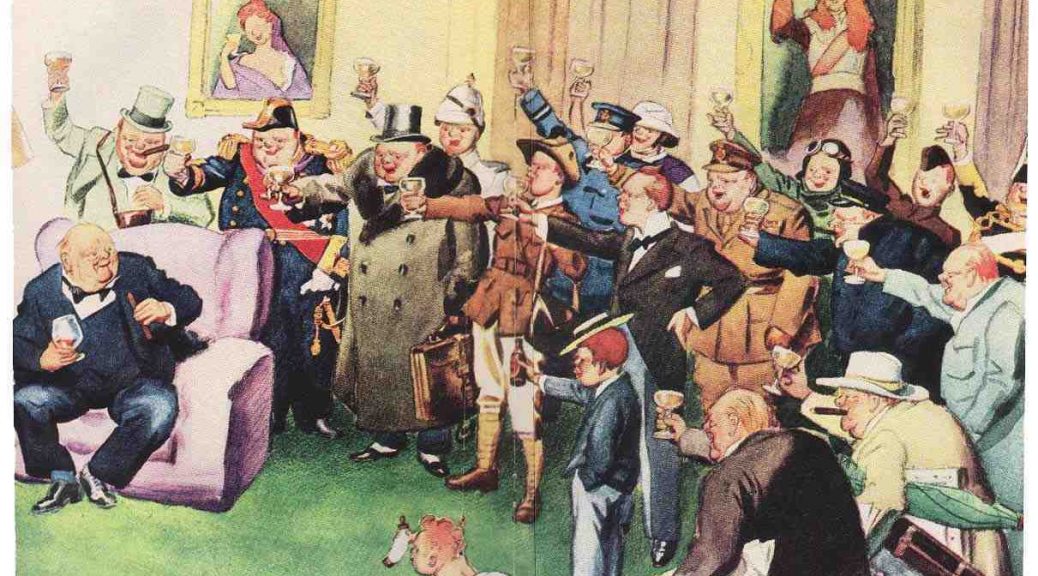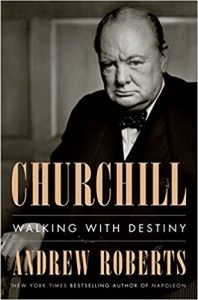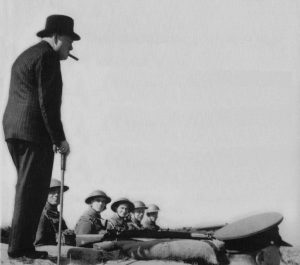
“No Cutlet Uncooked”: Andrew Roberts’s Superb Churchill Biography
Andrew Roberts, Churchill: Walking with Destiny. New York, Viking, 2018, 1152 pages, $40, Amazon $25.47, Kindle $17.99. Also published by the Hillsdale College Churchill Project. For Hillsdale reviews of Churchill works since 2014, click here. For a list of and notes on books about Churchill from 1905 currently through 1995, visit Hillsdale’s annotated bibliography.
“No Cutlet Uncooked”
He lies at Bladon in English earth, “which in his finest hour he held inviolate.” He would enjoy the controversy he still stirs today, in media he never dreamed of. And he would revel in the assaults of his detractors, the ripostes of his defenders. The vision “of middle-aged gentlemen who are my political opponents being in a state of uproar and fury is really quite exhilarating to me,” he said in 1952. (Yes, and the not so middle-aged, too.) Most of all, Winston Churchill would love this noble book. It peers into every aspect of a career six decades long, and not, as he once quipped, “entirely without incident.”
 In 1960 General Lord Ismay, the devoted “Pug,” said an objective biography could not be written for fifty years. Andrew Roberts weighs in at year fifty-eight. The delay paid off. Roberts was able to access sources only recently available. Not least of these are The Churchill Documents—invaluable papers in print through World War II. Roberts researched the Royal Archives at Windsor, the private papers of Churchill’s family. He quotes diarists like Ivan Maisky, Stalin’s ambassador to Britain. With his gift for separating wheat from chaff, this accomplished historian boils the saga down to digestible size.
In 1960 General Lord Ismay, the devoted “Pug,” said an objective biography could not be written for fifty years. Andrew Roberts weighs in at year fifty-eight. The delay paid off. Roberts was able to access sources only recently available. Not least of these are The Churchill Documents—invaluable papers in print through World War II. Roberts researched the Royal Archives at Windsor, the private papers of Churchill’s family. He quotes diarists like Ivan Maisky, Stalin’s ambassador to Britain. With his gift for separating wheat from chaff, this accomplished historian boils the saga down to digestible size.
* * *
Full disclosure: This writer labored for over a year as one of Roberts’ readers, sifting every word of his manuscript. Our emails, as he kindly notes, reached four figures. Together with the tenacious Paul Courtenay, we tackled every question. We ran down facts and factoids, arguing out every conclusion. With Hillsdale’s help, we checked unpublished parts of Sir Martin Gilbert’s “wodges.” These are documents, clippings and letters, compiled by Sir Martin, for almost every day of Churchill’s life.
Mr. Roberts, to quote his subject, “left no cutlet uncooked.” This is the first biography I’ve proofed since Manchester’s The Last Lion, so I am perhaps qualified to compare. No one will ever reach the lyrical heights of Horatius at the Gate, like Manchester did. Roberts is far more illuminating, accurate and up to date. Walking with Destiny is a masterpiece—the finest single Churchill volume you can hope to read. To paraphrase Simon Schama on Gilbert’s volumes, it is a “Churchilliad,” and Andrew Roberts is its Bard.
Seeing the Whole Man
Roberts captures the essence of his subject, beginning with courage. How many 40-year-olds, sacked from their job, go off to fight in a world war? “You must not let this fret you in the least,” Churchill nonchalantly assured his wife. Fret she did: “…you seem to me as far away as the stars, lost among a million khaki figures.” He left the trenches in 1916, Roberts notes. “He had written over 100 letters to her, which allows us to peer into his psychology better than at any other period of his life.”
Clementine Churchill never begrudged his predilections, from battle to politics, where somehow he managed to remain friends with opponents. He even socialized with them, in a club he invented for the purpose: “With Churchill there was very often a political angle to friendship. An extraordinarily large contingent of Other Club members came together to help make Churchill prime minister in several different ways, and then to serve in his wartime Government…. Churchill had built something that by 1940 was to make a very real contribution…”
The great man’s courage vied with his emotion, Roberts writes: “Lady Diana Cooper left a charming account of [a wartime] weekend at Ditchley…. ‘We had two lovely films after dinner…. Winston managed to cry through all of them, including the comedy.’ She told him that night that the greatest thing he had done was to give the British people courage. ‘I never gave them courage,’ he replied. ‘I was able to focus theirs.’” Exactly.
Canards fall like matchsticks…
… as Roberts methodically writes them off. It was not true, as Lord Mountbatten said, that young Winston left Cuba in 1895 with a liking for siestas and cigars. He already smoked cigars, did not start his afternoon nap until 1914. Regarding his overblown spells of the blues: “Churchill was not a depressive at all, let alone a manic one.” More likely he was a hypochondriac, “a man who took his own temperature daily and believed he had a sensitive cuticle.” His references to his “Black Dog” were part of “the sheer exaggeration to which he was prone. (Amateur diagnoses of him being bipolar can be even more easily dismissed.)”
At Omdurman in 1898, “within shot of an advancing army,” Churchill exclaimed, “Where will you beat this!” Such outbursts gained him “the undeserved reputation for being a lover of war, even though he was at constant pains to point out that the warfare he was describing was a world away from the industrialized horrors of the First World War.” His exuberance as WW1 began is frequently excoriated. “But it was the exuberance of someone who had not wanted the war to break out, had offered Germany the most generous and comprehensive plan to prevent it, had nonetheless planned meticulously what his department would do if it did, and who commanded the weapon that he believed could end it.”
* * *
Another myth is that Churchill always overemphasized the interests of whichever department he headed. Yet in the 1920s, as Chancellor of the Exchequer, he opposed deeper naval cuts than he’d budgeted: “Any other realistic alternative chancellor—Neville or Austen Chamberlain and certainly any Labour or Liberal one—would have been much tougher on the Admiralty…Overall, the naval budget increased during Churchill’s chancellorship.” (Italics mine.)
In World War II, Roberts explodes the myth that Churchill opposed a Second Front: “The very phrase Second Front was itself a term of Soviet propaganda, because Britain had already been fighting Germany on at least five fronts before the Soviets were forced by invasion to drop their pro-German neutrality; in Northern France, the air, the Atlantic, North Africa and the Mediterranean.”
“I want to see a great shining India…”
On India Churchill was partly influenced by diehards, like Beverley Nichols, author of Verdict on India. “It certainly shows the Hindu in his true character and the sorry plight to which we have reduced ourselves by losing confidence in our mission,” Churchill reported to Clementine.
But then his prescience surfaced: “Reading about India has depressed me for I see such ugly storms looming up…. still more about what will happen if [Britain’s connection] is suddenly broken. Meanwhile we are holding on to this vast Empire, from which we get nothing, amid the increasing abuse and criticism of the world, and our own people, and increasing hatred of the Indian population, who receive constant and deadly propaganda to which we can make no reply.” (And this long before the Internet!) Uniquely, Churchill saw and predicted India’s division: “…only a Muslim-majority state in the northern part of the Indian sub-continent would protect Muslim minority rights if and when the British left.”
* * *
He was right about that—and consistent. In July 1944 he told Sir Arcot Ramasamy Mudaliar, India’s representative on the War Cabinet: “It was only thanks to the beneficence and wisdom of British rule in India, free from any hint of war for a longer period than almost any other country in the world, [that India produced] this vast and improvident efflorescence of humanity…. Your people must practise birth control.” Then he added (and we will never see this quoted by his Indian haters) that the old idea that the Indian was in any way inferior to the white man must go. Specifically he said: “We must all be pals together. I want to see a great shining India, of which we can be as proud as we are of a great Canada or a great Australia.” ** There is the true Winston Churchill.
** Duff Hart-Davis, ed., King’s Counsellor: Abdication and War: the Diaries of Sir Alan Lascelles (London: Weidenfeld & Nicolson, 2006), 173.
Roberts Insights

Churchill famously “ratted” on the Conservatives over Free Trade—but was that his only objection? No, says Roberts: “Years later Churchill admitted that such was his reaction against the party at the time, over the harsh treatment of the defeated Boers, Army reform and the way the 1900 election victory was being exploited, that ‘when the Protection issue was raised I was already disposed to view all their actions in the most critical light.’ Churchill was spoiling for a fight with his own party.” This is fresh, excellent analysis. I have never heard his change of parties so comprehensively explained.
Had the 9th Duke of Marlborough died without an heir in 1934, Churchill would have become Duke, losing his Commons seat and any chance at the premiership, Roberts notes wryly: “He could survive a school stabbing, a 30-foot-fall, pneumonia, [nearly drowning in] a Swiss lake, Cuban bullets, Pathan tribesmen, Dervish spears, Boer artillery and sentries, tsetse flies, a Bristol suffragette, plane crashes, German high explosive shells and snipers, and latterly a New York motorist, but such was the British constitution that he also required the fecundity of a duke and duchess to allow him to be in the right place to save Britain in 1940.”
* * *
Saved by fecundity, he went on to warn the country in the 1930s. “It was a fascinating dichotomy,” Roberts writes, “that the leading appeasers had not seen action in the Great War…. Ramsay MacDonald, Stanley Baldwin, Neville Chamberlain, John Simon, Samuel Hoare, Kingsley Wood, Rab Butler and Lord Halifax did not serve in the front line or see death up close.” But the anti-appeasers, “Churchill, Anthony Eden MC, Harold Macmillan MC, Alfred Duff Cooper DSO, Roger Keyes KCB, DSO, Edward Spears MC and George Lloyd DSO all had.”
Another deft comparison: In India and the Sudan, young Winston had encountered Islamic fundamentalism, “a form of religious fanaticism that in many key features was not unlike the Nazism that he was to encounter forty years later. None of the three prime ministers of the 1930s—Ramsay MacDonald, Stanley Baldwin and Neville Chamberlain—had seen true fanaticism in their personal lives, and they were slow to discern it in Nazi Germany. [Churchill] had fought against it in his youth and recognized its salient features earlier than anyone else.”
“Never Surrender”
Churchill’s attitude towards Russia is often warped by his critics. Roberts sorts it out. “He started with profound enmity of the Bolsheviks, then by the late 1930s advocated an alliance with them. Then in 1939-40 he supported Finland in its war against them, then in 1941 he allied Britain with them overnight. In 1946 he denounced them, only in the 1950s to seek détente with them.” His view of Russia changed five times. “Yet the explanation was not in any inherent lack of consistency, as is often alleged, but what was in the ‘historic life-interests’ of Britain.”
Deftly Roberts explains the peace chatter of late May 1940. With Britain’s back to the wall, Lord Halifax clamored for an armistice brokered by Mussolini. Halifax was “the only one who understood,” nodded French Premier Reynaud’s Anglophobic aide Lt-Col. Paul de Villelume. Churchill was “prisoner of the swashbuckling attitude he always takes in front of his ministers.”
Halifax first thought Churchill welcomed a deal which preserved Britain’s independence. Then he protested that the PM believed in nothing save a fight to the finish. “This was in fact always Churchill’s line,” Roberts explains. It’s quite clear “if all five days’ discussions are read in context.”
* * *
Six weeks before D-Day Churchill was cautious. “We can now say, not only with hope but with reason, that we shall reach the end of our journey in good order. [The] tragedy will not come to pass. When the signal is given, the whole circle of avenging nations will hurl themselves upon the foe.”
Roberts juxtaposes two reactions. “This was the speech of an old man,” said the King’s private secretary. “Someone who clearly did not think so was Anne Frank, the Jewish Dutch teenager, who wrote in her diary from her secret attic in Amsterdam, ‘A speech by our beloved Winston Churchill is quite perfect.’”
General Sir Alan Brooke’s late night fuming about Churchill is often held to show the PM’s feet of clay—and Lord knows he had them. But Roberts shows us a different Brooke. Take when the boss arrives in France after D-Day. “I knew that he longed to get into the most exposed position possible. I honestly believe that he would really have liked to be killed on the front at this moment of success. He [had said] the way to die is to pass out fighting when your blood is up and you feel nothing.” Part of Churchill’s admiration for Admiral Nelson, Roberts suggests, “was for his glorious death at the moment of victory.”
Readers: Buy This Book
Space is running out and I haven’t told you the half of it. There are 78 illustrations, most of them unique even to jaded Churchillians. Roberts did his best to avoid “old chestnuts.” There are sixteen pages of clear maps. The 1950s Reader’s Union map of Churchill’s wartime journeys is worked nicely into the endpapers. The book weighs 3 1/2 pounds—don’t drop it on your foot. The page stock is thin, but well chosen to minimize bleed-through. The bibliography, attesting to its thoroughness, runs to 23 pages, the author’s notes to 37, the index to 60. Amazon offers an attractive 40% discount and a Kindle version. This is little to pay for the education you’ll receive.
Andrew Roberts has been book-touring Britain (as he soon will be in North America). His has encouraging news for all who “labor in the vineyard,” as dear Martin Gilbert always described it. “There’s an explosion of love of Churchill among ordinary people away from the London metropolitan bubble,” Roberts writes. “It’s like 1940 in terms of his popularity, whenever you get away from the smug elites. We sell out constantly. Very heartening. Sometimes one can feel down over the Internet attacks and the statue smearings. But out in rural England he’s as much loved as ever. Our life’s work has borne fruit.”






